
The newsletter of UCL Library Services - Issue 18: Spring term, 2008
Inside this issue
|
Editorial board members:
Elizabeth Chapman, Chris Carrington, Deborah Furness, Elizabeth Lawes, Grazia Manzotti, Dayaram Nakrani, Ruth Russell & Margaret Stone.
:: Contact the editorial board
|
Related links:
- Newsletter Archive
- UCL Library Services News
|
Charting China
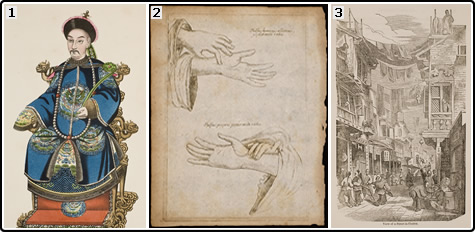 Above:
Above: 1. Portrait of Emperor Daoguang the seventh emperor of the Manchu Qing dynasty. From Samuel Kidd's China. 1841 [Special Collections: R 680 RC 10 KID]
2. Pulse positions and methods for taking a pulse, from Andreas Cleyers' Specimen medicinae Sinicae, sive opuscula medica ad mentem Sinensium. 1682 [SRE 950 S6]
3. View of a Street in Canton taken from Samuel Well Williams's The Middle Kingdom. 1857 [Rotton 39.j.27]
As part of the China Now 2008 Festival - the UK's largest ever festival of Chinese culture - UCL Library Services is now displaying a number of historical items from Special Collections in the first exhibition of the New Year, Charting China.
UCL was one of the first universities in Britain to make provision for the study of China and our exhibition seeks to illustrate UCL's early engagement with China and to illustrate the extent of western fascination with the country from the 16th to the 19th centuries.
The exhibition contains many items of historical and artistic significance, dealing with many aspects of China: its culture and language, its geography and history, its society and traditions.
A notable exhibit is a copy of Athanasius Kircher's China monumentis / illustrata (1667) - a compilation of previous writings and reports from Jesuit missionaries working in China. It is a monumental work, containing many engraved plates, that was quickly translated into Dutch, English and French and soon became the starting point for all those who subsequently wrote or thought about China.
Also on display will be a copy of Andreas Cleyer's Specimen medicinae Sinicae, sive opuscula medica ad mentem Sinensium (1682) which contains a translation of the notable work on pulse diagnosis, Mai Jing or The Pulse Classic, attributed to Wang Shuhe. This was the first text of its kind to describe sphygmology, the study of the pulse.
The exhibition will be running from early February until May 2008 and will be housed in the Main Library exhibition case, Wilkins Building.
It is also available online as part of UCL Library Services' Digital Collections service.
by Steve Wright
24 hour opening at UCL Main and UCL Science Libraries
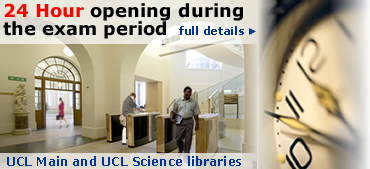 UCL is pleased to announce that UCL's two largest campus libraries - the UCL Main Library (Wilkins Building) and the Science Library (DMS Watson Building) - will open for 24 hours in the run-up to, and during, the exam period.
UCL is pleased to announce that UCL's two largest campus libraries - the UCL Main Library (Wilkins Building) and the Science Library (DMS Watson Building) - will open for 24 hours in the run-up to, and during, the exam period.
From Wednesday 26th March until Saturday 24th May 2008, the UCL Main and UCL Science libraries will open at 0845 on Mondays, remaining open continuously until closure at 2100 on Saturdays.
On Sundays, they will be open from 1100 until 2100.
Full details of opening arrangements, plus issue desk hours, for all UCL libraries over the Easter vacation and in the 3rd Term, including the May 5th Bank Holiday, are available at: http://www.ucl.ac.uk/library/opening.
by Paul Ayris
Staff profile: Sara Clarke
Sara Clarke, Knowledge Resources Librarian, Royal Free Medical Library
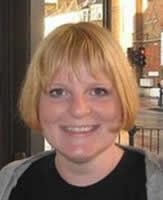 I've been at the Royal Free Medical Library (RFML), UCL Library Services, since February 2007, and before that I worked at the UCL Institute of Child Health and NICE. Like many librarians I stumbled upon this career after completing my first degree (in Drama and Theatre Studies) and being slightly stumped as to what to do next. Thankfully I have developed a love for medical information so feel I am in the right place!
I've been at the Royal Free Medical Library (RFML), UCL Library Services, since February 2007, and before that I worked at the UCL Institute of Child Health and NICE. Like many librarians I stumbled upon this career after completing my first degree (in Drama and Theatre Studies) and being slightly stumped as to what to do next. Thankfully I have developed a love for medical information so feel I am in the right place!
My post supports the development and implementation of healthcare knowledge resources locally and this translates into a diverse range of activities.
The Royal Free Medical Library is contracted to provide two of the National Library for Health Specialist Libraries - for Gastroenterology and Liver Diseases and for Neurological Conditions. The Specialist Libraries are online repositories of information and evidence, designed to make it easier for doctors and other health professionals to find medical information. I project manage both of the libraries, working alongside clinical leads, which means my role is incredibly varied. I liaise with specialists from across the country over the content of the libraries, I attend meetings and conferences to promote the libraries, and I ensure that project tasks are completed on time, amongst many other things!
Members of the Library's "evidence team" work closely with staff in the hospital, providing evidence and information to improve patient care. A major project we are currently working on will help to decrease waiting times for patients. This involves the implementation of the Map of Medicine, an innovative clinical knowledge framework organised into more than 300 patient care journeys. This was originally created locally, with Library input, but is now being implemented across NHS England.
In addition to this, I am also jointly responsible for overseeing the training programme for members of the Library in accessing and quality assessing online information. Similar programmes are available across UCL libraries.
by Sara Clarke
Blogs
The Library has started using Web 2.0 technology as a means of communicating with students and staff.
Although the mention of blogs might evoke thoughts of badly-written online diaries, the application can also be utilised to help a service more effectively reach its users. A blog is really just a type of website, but one that can be updated more easily and allows more interactivity with readers.
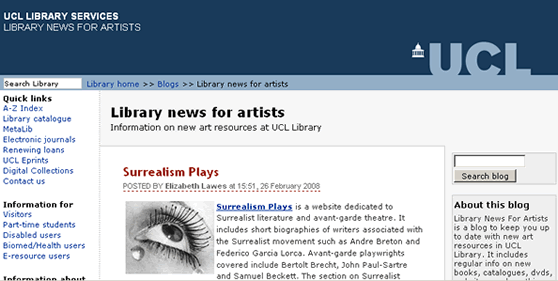 Above:
Above: Screenshot of "Library news for artists" - a UCL Library Services blog on Art resources.
Fundamental to blogs is the RSS feed. Feeds allow you to keep up to date with your favourite websites and effectively act like bookmarks which alert you when a page you have bookmarked has been updated. So, if there are a number of blogs that you view regularly, an RSS feed reader will tell you when a new entry has been added, saving you the bother of having to continually check back. Blogs can therefore become a good way of staying in touch with an organisation or service that you use, and are less intrusive than email alerts. RSS feed readers can be either downloaded onto your desktop (there are numerous free ones available on the internet) or are web-based e.g. Bloglines, Google Reader.
UCL Library Services has recently acquired software to enable the creation of blogs and a small number of Subject Librarians have been given the opportunity to trial the service. Their blogs have recently been launched to their respective departments and feedback from academics and students has already been very positive and enthusiastic. The blogs differ slightly in approach. The one aimed at the Department of Political Science is used purely to inform its members about new books that have been purchased, whereas the blogs for the Slade School of Fine Art, Anthropology and Human Communication Sciences include a greater variety of information - news about resources, useful websites and other library developments. It will be interesting to see how these different approaches evolve over time.
An important characteristic of blogs is their two-way nature - the ability of readers to comment on content or contact the author. With this in mind, do have a look at our blogs and let us know what you think.
by Peter Williams
Newspapers
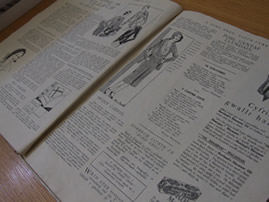 For many areas of research newspapers can be a key source of information, but tracking them down can sometimes be difficult. Many newspapers are now freely available on the Internet but they are only accessible for a short time so if you are looking for articles on events that happened in the past you will need to consult some sort of index. UCL Library Services subscribes to a number of online databases that either enable you to identify published articles, or which allow access to the newspaper articles themselves.
For many areas of research newspapers can be a key source of information, but tracking them down can sometimes be difficult. Many newspapers are now freely available on the Internet but they are only accessible for a short time so if you are looking for articles on events that happened in the past you will need to consult some sort of index. UCL Library Services subscribes to a number of online databases that either enable you to identify published articles, or which allow access to the newspaper articles themselves.
NexisUK has the full-text of regional, national and international newspapers back as far as the mid-1980s in many cases, although sadly, there are no pictures. The same data is accessible through related links to Lexis Nexis (Business & News) from LexisNexis Butterworths legal database.
The Times Digital Archive 1785-1985 is the best full-text resource that we currently subscribe to for historical events although we hope to gain access to the Guardian/Observer Archive later this year.
The British Humanities Index was first published in 1916 by the Library Association as the "Subject Guide to Periodicals" and this is available in our Main Library Reference Collection. In 1962 it changed its name and we have access to it online from that date onwards. As well as recording literature published in various humanities journals it also indexes the "quality newspapers". However, coverage is somewhat selective and it doesn't include the Daily and Sunday Telegraph.
The Newspaper collections of the British Library are housed in Colindale, Northwest London and are the largest of their kind anywhere in the world. They have recently digitised some of their older newspapers and these are now available as 19th Century British Library Newspapers.
Senate House also has a lot of newspaper resources, many of which are now available online. See their web pages at http://www.shl.lon.ac.uk/resources/ullnews.shtml.
by Debs Furness
Spotlight on... UCL SSEES Library
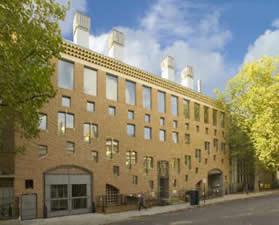 The last issue of this newsletter featured a picture of the award winning new building for the UCL School of Slavonic and East European Studies. Since opening in the summer of 2005 both the building and the library that occupies the bottom four floors have become well visited tourist sites, so if you are interested in modern architecture the UCL SSEES Library is well worth a visit. It is even more worth visiting if you are interested in almost any aspect of European history, politics, economics, literature, or culture, as it contains the largest open access collection of books and journals in the UK on Europe from Germany eastwards to Russia, and from Finland and the Baltic states in the north to the Balkans in Southern Europe.
The last issue of this newsletter featured a picture of the award winning new building for the UCL School of Slavonic and East European Studies. Since opening in the summer of 2005 both the building and the library that occupies the bottom four floors have become well visited tourist sites, so if you are interested in modern architecture the UCL SSEES Library is well worth a visit. It is even more worth visiting if you are interested in almost any aspect of European history, politics, economics, literature, or culture, as it contains the largest open access collection of books and journals in the UK on Europe from Germany eastwards to Russia, and from Finland and the Baltic states in the north to the Balkans in Southern Europe.
The Library's collections have been growing steadily since the founding of the School in 1915, when it was established to study the new states appearing as a result of the collapse of the Austro-Hungarian and Russian Empires. Throughout its history books have reached the Library by a variety of unorthodox routes; one early consignment of Russian books arriving via the good offices of the British Ambassador in Petrograd in 1917, many since have been acquired through good personal contacts, up to and including several future heads of state who have studied or taught at the School.
Nowadays the Library contains almost 400,000 volumes in a wide variety of languages (including many in English), of which about two thirds are on the open shelves in the new building and the rest easily retrieved from the UCL store out at Wickford. The Library's archive collections include many fascinating original documents tracing the history of British relations with Eastern Europe, and scholars from all over the world are regular visitors.
by Lesley Pitman
The more e-books, the better...
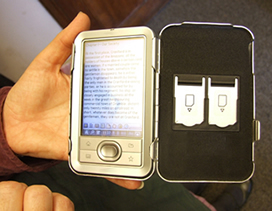 ...reflects the very many positive comments in response to the SuperBook 2006 survey into e-book usage at UCL, with one respondent going so far as to describe e-books as "an awesome idea". The Library already provides access to quarter of a million digitised versions of titles published before the start of the nineteenth century (Early English Books Online, Eighteenth Century Collections Online), alongside sizeable and growing collections of current reference works and scholarly monographs. We are very keen to extend this service - in particular as a means of providing quick and easy access to recommended course readings - using the findings from various projects, as well as recommendations from UCL staff and students, to guide us.
...reflects the very many positive comments in response to the SuperBook 2006 survey into e-book usage at UCL, with one respondent going so far as to describe e-books as "an awesome idea". The Library already provides access to quarter of a million digitised versions of titles published before the start of the nineteenth century (Early English Books Online, Eighteenth Century Collections Online), alongside sizeable and growing collections of current reference works and scholarly monographs. We are very keen to extend this service - in particular as a means of providing quick and easy access to recommended course readings - using the findings from various projects, as well as recommendations from UCL staff and students, to guide us.
SuperBook provided valuable information about take-up and patterns of usage. As a direct result, we are now subscribing to heavily used titles from Oxford Scholarship Online, Taylor & Francis and Wiley InterScience. The results also demonstrated that titles that had been catalogued were more likely to be found and used, hence our aim to add details of all our e-books to the eUCLid catalogue. In addition, the high volume of usage from halls of residence provided clear evidence in support of demand for access off-site and outside library opening hours.
We are currently building on these findings by participating in two pilot projects, one the JISC National E-books Observatory, the other a partnership between UCL and Cambridge University Press. The first, involving 36 core texts in Engineering, Media Studies, Business & Management, and Medicine, will allow us to compare our usage with that at over 120 other institutions. The second, in addition to providing access to over 700 e-books of particular interest to Law and Biomedical & Life Sciences, will help us to tailor our provision in two disciplinary areas where enhancing e-delivery has been identified as an especially high priority.
The results of a survey covering Law students' library usage and preferences suggest that interest in e-books, including e-versions of titles already in the Law collection, is likely to be significant. In the case of Biomedicine, an increased emphasis on e-delivery is especially appropriate, as staff and students are based at a number of sites across London and clinical students spend substantial amounts of time on placements outside London.
Both projects are due to end in August 2009 and the findings will inform our evolving e-resources strategy. In the meantime, further information can be found at Ebooks at UCL.
by Diana Mercer
UCL Library Services in the 21st century
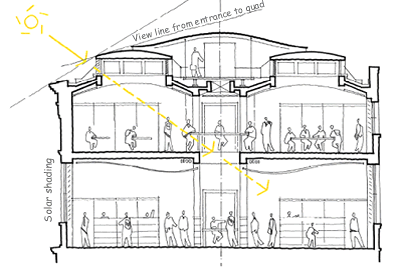
Possible re-modelling of space in the UCL Main Library: Option 1
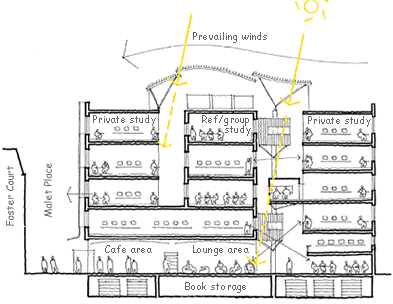
Possible remodelling of the UCL Science Library: Option 1
For six months between Summer and Christmas 2007, a Master Planning Team in UCL met to look into the future. Chaired by me as Director of UCL Library Services, the Team also included external consultants - notably the architects BDP (Building Design Partnership), members of UCL Estates and Facilities, members of library staff and 2 senior academic members of staff.
The UCL Main and Science Libraries on the Bloomsbury campus are two of the busiest service points in the whole of the university. The UCL Main Library in the Wilkins Building is in a grade 1 listed building, whilst the UCL Science Library is in two converted 1930s warehouses.
The needs of teaching, learning and research have changed a lot since the Library first opened its doors in 1829. We are about to open the UCL Main and Science Libraries for 24 hour opening in the run-up to, and during, exams. Students in Science, Technology and Medicine often work in groups and are expected to undertake project work. Library spaces need to develop into integrated learning spaces, as well as remaining collection spaces, to support students as they work in this way.
Digital delivery is now all-pervasive, but the pace of change in Arts, Humanities and some Social Sciences is slower than in Science, Technology and Medicine. There is a great deal of interest in E-Books, but the Master Planning Team noted that Arts and Humanities students and scholars will still require access to printed monographs and to quiet study spaces for the foreseeable future.
The two Main Reports from the Master Planning Team are now available in the UCL Discovery repository at http://discovery.ucl.ac.uk/5048 and http://discovery.ucl.ac.uk/5051. The findings were informed by a web survey, which attracted 2,940 responses. The Reports look at two sets of options - the possibilities for refurbishment and extension of the existing buildings, and the possibility of a newbuild, central site library, which would act as a flagship library building for UCL. The newbuild option emerged as the preferred option of the Master Planning team.
The Reports are the start of a long process of reflection and deliberation in UCL, but they offer a real glimpse into what the future could look like. Take a look for yourself!
by Paul Ayris
UCL Library Services Green Group Launch

In February the UCL Library Services Senior Management Team gave the go-ahead for the Green Library Group to pilot for one year to see how we get on. Our Terms of Reference are to:
- Raise awareness of environmental issues in the workplace and to encourage and support staff in making their working practices more sustainable
- Work within UCL's developing strategy on sustainability
- Monitor implementation of the UCL Library Services' Environmental Statement
- Consider reports and suggestions from members of staff and others on how to improve sustainable performance in the workplace
- Ensure the effective communication of environmentally friendly working practices
We in UCL Library Services are committed to:
- the most efficient use of energy in all areas of our operations
- reducing the waste of energy wherever possible
- reducing the amount of materials we use in doing our work
- reusing those materials that have outlived their original purpose wherever we can
- recycling as much of the used materials that cannot be reused as we can
- working with the UCL Estates and Facilities Division, and all other departments throughout UCL to ensure that we conduct our business in the most environmentally sustainable way that we can
We aim to have a green rep in every library site and department. These reps will spend a minimal part of their time doing specific "green things" but all of their time being generally environmentally aware. They will monitor what is happening in their own workplaces and generally spread the word about best environmental practices in libraries.
Please help us in Library Services to help you to save your planet.
by Bill Lehm
 Top of page Top of page
Issue 18 - Spring term, 2008
|

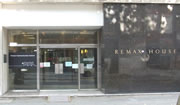
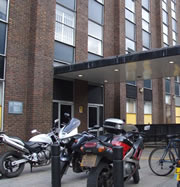
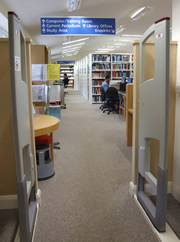


 Above: 1. Portrait of Emperor Daoguang the seventh emperor of the Manchu Qing dynasty. From Samuel Kidd's China. 1841 [Special Collections: R 680 RC 10 KID]
Above: 1. Portrait of Emperor Daoguang the seventh emperor of the Manchu Qing dynasty. From Samuel Kidd's China. 1841 [Special Collections: R 680 RC 10 KID] UCL is pleased to announce that UCL's two largest campus libraries - the UCL Main Library (Wilkins Building) and the Science Library (DMS Watson Building) - will open for 24 hours in the run-up to, and during, the exam period.
UCL is pleased to announce that UCL's two largest campus libraries - the UCL Main Library (Wilkins Building) and the Science Library (DMS Watson Building) - will open for 24 hours in the run-up to, and during, the exam period.
 I've been at the Royal Free Medical Library (RFML), UCL Library Services, since February 2007, and before that I worked at the UCL Institute of Child Health and NICE. Like many librarians I stumbled upon this career after completing my first degree (in Drama and Theatre Studies) and being slightly stumped as to what to do next. Thankfully I have developed a love for medical information so feel I am in the right place!
I've been at the Royal Free Medical Library (RFML), UCL Library Services, since February 2007, and before that I worked at the UCL Institute of Child Health and NICE. Like many librarians I stumbled upon this career after completing my first degree (in Drama and Theatre Studies) and being slightly stumped as to what to do next. Thankfully I have developed a love for medical information so feel I am in the right place!
 Above: Screenshot of "Library news for artists" - a UCL Library Services blog on Art resources.
Above: Screenshot of "Library news for artists" - a UCL Library Services blog on Art resources.
 For many areas of research newspapers can be a key source of information, but tracking them down can sometimes be difficult. Many newspapers are now freely available on the Internet but they are only accessible for a short time so if you are looking for articles on events that happened in the past you will need to consult some sort of index. UCL Library Services subscribes to a number of online databases that either enable you to identify published articles, or which allow access to the newspaper articles themselves.
For many areas of research newspapers can be a key source of information, but tracking them down can sometimes be difficult. Many newspapers are now freely available on the Internet but they are only accessible for a short time so if you are looking for articles on events that happened in the past you will need to consult some sort of index. UCL Library Services subscribes to a number of online databases that either enable you to identify published articles, or which allow access to the newspaper articles themselves.
 The last issue of this newsletter featured a picture of the award winning new building for the UCL School of Slavonic and East European Studies. Since opening in the summer of 2005 both the building and the library that occupies the bottom four floors have become well visited tourist sites, so if you are interested in modern architecture the UCL SSEES Library is well worth a visit. It is even more worth visiting if you are interested in almost any aspect of European history, politics, economics, literature, or culture, as it contains the largest open access collection of books and journals in the UK on Europe from Germany eastwards to Russia, and from Finland and the Baltic states in the north to the Balkans in Southern Europe.
The last issue of this newsletter featured a picture of the award winning new building for the UCL School of Slavonic and East European Studies. Since opening in the summer of 2005 both the building and the library that occupies the bottom four floors have become well visited tourist sites, so if you are interested in modern architecture the UCL SSEES Library is well worth a visit. It is even more worth visiting if you are interested in almost any aspect of European history, politics, economics, literature, or culture, as it contains the largest open access collection of books and journals in the UK on Europe from Germany eastwards to Russia, and from Finland and the Baltic states in the north to the Balkans in Southern Europe.
 ...reflects the very many positive comments in response to the SuperBook 2006 survey into e-book usage at UCL, with one respondent going so far as to describe e-books as "an awesome idea". The Library already provides access to quarter of a million digitised versions of titles published before the start of the nineteenth century (Early English Books Online, Eighteenth Century Collections Online), alongside sizeable and growing collections of current reference works and scholarly monographs. We are very keen to extend this service - in particular as a means of providing quick and easy access to recommended course readings - using the findings from various projects, as well as recommendations from UCL staff and students, to guide us.
...reflects the very many positive comments in response to the SuperBook 2006 survey into e-book usage at UCL, with one respondent going so far as to describe e-books as "an awesome idea". The Library already provides access to quarter of a million digitised versions of titles published before the start of the nineteenth century (Early English Books Online, Eighteenth Century Collections Online), alongside sizeable and growing collections of current reference works and scholarly monographs. We are very keen to extend this service - in particular as a means of providing quick and easy access to recommended course readings - using the findings from various projects, as well as recommendations from UCL staff and students, to guide us.
 Possible re-modelling of space in the UCL Main Library: Option 1
Possible re-modelling of space in the UCL Main Library: Option 1 Possible remodelling of the UCL Science Library: Option 1
Possible remodelling of the UCL Science Library: Option 1

